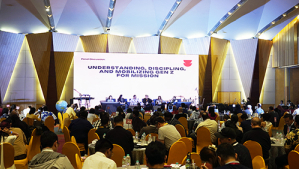
At a time when churches around the world are grappling with declining youth engagement, a diverse group of Christian leaders at the Arise Leadership Summit 2025 made a compelling case for rethinking how the Church engages with Generation Z—today’s most digitally connected and spiritually seeking demographic.
In a wide-ranging panel discussion held during the four-day gathering in Indonesia, participants representing varied contexts shared stories, strategies, and reflections on the theme of "understanding, discipling and mobilizing Gen Z for mission." Speakers emphasized that effective discipleship today requires not only a change in language and strategy, but also a change in posture—one that sees young people not as passive recipients of teaching, but as capable co-laborers in the global church.
The conversation built on a keynote address earlier in the day that characterized Gen Z as uniquely positioned to lead in a rapidly changing, post-pandemic world.
From digital natives to mission catalysts
One youth leader described Gen Z as a generation that must be understood as “capacity-proportionate, not age-proportionate.” Rather than waiting for young people to reach a certain age before entrusting them with responsibility, the Church must recognize and empower their current capabilities.
She illustrated the point with an example of her 15-year-old nephew who independently organized and led online tutoring sessions for students preparing for national board exams—designing flyers, managing Zoom links, and scheduling sessions on his own. “If we are waiting for them to turn 25 or 35 and say, ‘Oh, this is when they should be doing these things,’ we’ve got it all wrong,” she said.
Panelists agreed that this generation lives in two simultaneous realities—the physical and the digital—and both must be acknowledged and engaged. Rather than dismissing social media and online culture as distractions or spiritual threats, churches should treat the digital space as a valid domain for mission and mentorship.
“Sometimes we are so dismissive of the digital world,” one speaker noted. “But we need to remember and also acknowledge the digital space and engage with them in the digital space as well.”
Shaped by suffering, strengthened by faith
Panelists from regions facing social or religious restrictions added another layer to the conversation explaining how Gen Z in minority or persecuted communities often carry complex identities marked by fear, resilience, and spiritual longing.
One speaker recalled hiding part of his Christian name during college for fear of being targeted. “Persecution is a blessing. It helps in faith building. But if they are not really biblical rooted, they are suffering,” he said.
He stressed that discipleship in these environments requires deep intentionality: “We need to really think about them—how are we mentoring them, how are we discipling them?”
Misunderstood and mischaracterized
Several leaders pushed back against common stereotypes of Gen Z, such as apathy, disloyalty, or resistance to commitment. “They want authenticity,” one panelist said. “Many are passionate about Jesus, but wary of performance-based religion or even sadly, church politics. Gen Z is allergic to inauthentic leadership.”
He added that while Gen Z may seem skeptical of institutional faith, they are intensely curious about Jesus, justice, and how faith intersects with the world’s brokenness.
This generation, another speaker observed, is less impressed by titles and authority than by vulnerability and integrity: “They question authority, but not out of defiance. It’s often out of a desire for integrity and clarity.”
Mentorship, not management
A major theme echoed throughout the panel was the importance of walking with Gen Z in mutual discipleship. “Mentoring and discipleship is not parenting,” one panelist emphasized. “It’s a long-lasting effort until your last breath.”
This posture shift requires adults to be intentional about entering the world of young people—understanding their language, navigating their platforms, and being available to journey alongside them in both success and failure.
One panelst described his ministry’s approach as offering “multiple anchors”—a layered mentoring model that supports spiritual guidance, leadership development, and emotional health. “It doesn’t matter if you’re young,” he said. “There’s always room to fail. You’ll be given a platform, an opportunity to serve.”
Several speakers also described creating “safe spaces” where young people can ask difficult questions without fear of judgment or shame.
From platform to participation
Speakers repeatedly emphasized that Gen Z doesn’t just want to be inspired—they want to be involved. One leader urged churches to move from “training Gen Z for our ministries” to “creating space for Gen Z to lead theirs.”
This includes trusting young people with responsibility early on and equipping them with tools to discern their calling. One panelist highlighted the impact of inviting a teenager to lead a devotional at a national event: “He was very nervous to come up on stage and share it, but he was so impactful… all of us were like, wow.”
Others shared examples of young leaders creating new forms of ministry—from organizing evangelistic gatherings in public parks to launching digital media projects that communicate the gospel in culturally relevant ways. What they need, panelists stressed, is not more instruction, but support.
“Many younger people have ideas,” a panelist shared. “But they feel there aren’t many adults really to support them.”
Bridging the generational divide
Several panelists acknowledged that fostering collaboration between generations isn’t always easy. Miscommunication, unspoken expectations, and cultural hierarchies can cause frustration. In many societies, younger leaders are expected to conform to traditional authority without question, and when they don’t, they risk exclusion.
One speaker warned that Gen Z will quietly disengage rather than confront conflict. “Gen Zs tend to avoid conflict. If they feel that they are not heard, they will just leave,” he said. Therefore, it is important to create a space where their voice is heard.
The panel concluded that true intergenerational collaboration involves more than symbolic gestures. It requires sharing leadership, co-creating ministry models, and building a culture of mutual respect and shared vision.
“It’s not about handing off responsibility or holding onto control, but co-laboring in humility,” one panelist said.
Providing space at the table
One of the final messages from the panel was a call to give Gen Z a literal and metaphorical seat at the table—not after they’ve proven themselves, but now.
“By the time we give them a voice, they are not young leaders anymore. There is space for everyone—so create space now,” one leader said.
The panel concluded with a shared conviction: Gen Z is already serving, already leading, already asking hard questions about Jesus, justice, and mission. What they need is companionship.






